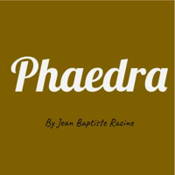
Overview
Synopsis
A tragic myth from Ancient Greece, Jean Baptiste Racine’s retelling of Phaedra is renowned for its depth of poetry and complex characterization of the titular tragic figure. Phaedra is the wife of Theseus and stepmother to Hippolytus. After word arrives that Theseus has been killed during his expedition, Phaedra confesses that she is actually in love with her stepson. Her wild and erratic emotional states have been the result of denying her passion for Hippolytus, and she begs him to form an alliance with her--or kill her out of pity. However, the prince is disgusted by Phaedra, and pursues his love for Aricia, a young princess kept as a prisoner. When Theseus, to everyone’s amazement, returns alive and well, he is baffled at the strange behavior of his wife and son. To protect Phaedra’s honor, the nurse Oenone crafts a lie: Hippolytus attempted to rape Phaedra. Father and son confront each other, the deceit falls apart, and in her final moments, Phaedra confesses her sins. A dynamic and moving tragedy, Racine’s Phaedra is a haunting examination of forbidden passion and ultimate deceit.
Show Information
Context
Plot
Characters
| Name | Part Size | Gender | Vocal Part |
|---|---|---|---|
|
Lead |
Female |
Non-singer |
|
|
Lead |
Male |
Non-singer |
|
|
Lead |
Male |
Non-singer |
|
|
Supporting |
Female |
Non-singer |
|
|
Supporting |
Female |
Non-singer |
|
|
Supporting |
Male |
Non-singer |
|
|
Supporting |
Female |
Non-singer |
|
|
Supporting |
Female |
Non-singer |
Songs
A song with an asterisk (*) before the title indicates a dance number; a character listed in a song with an asterisk (*) by the character's name indicates that the character exclusively serves as a dancer in this song, which is sung by other characters.
Monologues
Scenes
Key Terms
The Académie Française is France’s official council on the French language, founded in 1635. It regulates grammar, vocabulary, and usage, shaping literary and theatrical traditions. Its authority has influenced how plays are written, translated, and preserved in French culture.
Dramatic rules from Aristotle’s *Poetics* prescribing unity of time, place, and action in classical tragedy.
A body of traditional stories involving gods, heroes, and creation myths. Mythology provides inspiration for characters and narratives in global theatre traditions.
Works not protected by copyright and available for free use or adaptation. Many classical plays, including Shakespeare's, fall into the public domain.
A Tragedy is a form of drama that explores human suffering, conflict, and loss, often leading to a disastrous or fatal conclusion. Traditionally, the main character experiences downfall due to a personal flaw, poor judgment, or forces beyond their control. Tragedy aims to evoke pity and fear in the audience, leading to reflection and emotional release.
Videos
Quizzes
Themes, Symbols & Motifs
Sorry! We do not currently have learning modules for this guide.
Quote Analysis
Sorry! We do not currently have learning modules for this guide.
